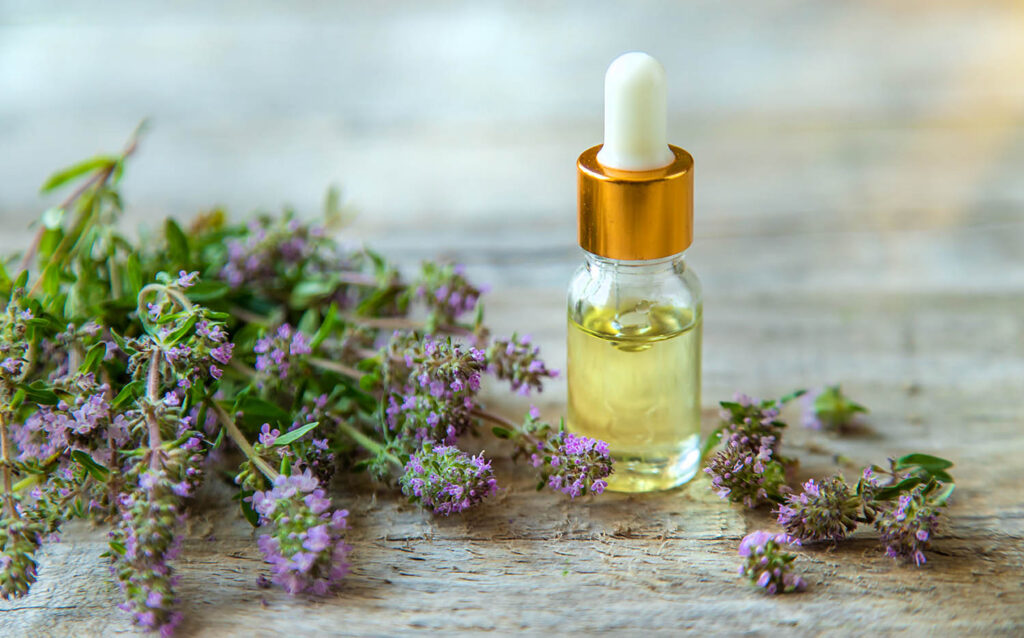Introduction
Essential oils are popular as an easy addition to anyone’s wellness routine. They’re everywhere and boast a ton of supposed benefits that make you healthier.
But do they actually work? What are essential oils exactly anyway? What does science say about their effectiveness or lack thereof?
We’ll answer these questions and more in this article.

What are Essential Oils?
Essential oils are compounds extracted from plant parts. These parts may be leaves, flowers, stems, and roots, and they give off aromatic compounds that — as we’ll investigate — may provide therapeutic properties.
In a word, essential oils are the “essence” of various plant parts.
Processes for obtaining essential oils usually involve:
- Distillation
- Cold pressing
- Solvent extraction
Once the aromatic compounds are ready, they’re combined with carrier oil to manufacture the final products you buy as essential oils.
Some of the most popular essential oils in the market are:
- Peppermint
- Lavender
- Sandalwood
- Bergamot
- Rose
- Chamomile
- Jasmine
- Tea tree
- Lemon
Quick History of Essential Oils
Records show that essential oils originated from India, Persia, and Egypt1, and they’ve been used for various purposes across cultures for thousands of years.
For instance, Ancient Egyptians used aromatic oils in ointments and cosmetics starting from 4500 BC. Meanwhile, traditional Indian and Chinese medicine relied on these oils for healing from 3000 to 2000 BC2.
In the west, French chemist René-Maurice Gattefossé discovered the healing properties of lavender oil. He applied it to a burn on his hand after an explosion in his laboratory. Then, he analyzed the chemical properties of essential oils and how they could be used to treat burns, skin infections, gangrene, and wounds of soldiers in World War I3.
And in 1928, Gattefossé founded the science of aromatherapy. Come the 1950s, beauticians, nurses, physiotherapists, and other healthcare providers started using aromatherapy. In the US, aromatherapy didn’t gain popularity until the 1980s.
How to Use Essential Oils
You can use essential oils in different ways such as the following.
Using a Diffuser
Diffusers dispense essential oils into the air, and they come in different types. You should always follow the manufacturer’s instructions whenever using any type of diffuser. Some of the most popular types include:
- Ceramic
- Electric
- Candle
- Lamp rings
- Reed diffusers
- Ultrasonic
Through Inhalation
The most straightforward method in this list is inhalation. Simply open a bottle of pure essential oil and inhale deeply several times. Prevent the undiluted oil from touching your skin to avoid risks of irritation.
You can also use the steam method. Follow these steps:
- Prepare a bowl of hot water and a towel.
- Add a few drops of essential oil to the hot water.
- Close your eyes and deeply inhale the steam for a few minutes.
- Repeat this several times throughout the day.
Dry Evaporation
Dry evaporation requires the use of dry materials such as fabric or cotton balls.
Simply add a few drops of essential oil to the material and hold it to your nose and inhale it. You can also allow the scent to disperse naturally.
On top of that, you can add the material to other places such as your pillowcase, your collar, or even your car vents.
Topical Method
To use essential oils on your skin, dilute them with a carrier oil first. You can follow a recipe or create your own using your favorite combination of oils. The topic method is best for alleviating muscle pain, tension, and tightness.
Essential oil-infused cosmetic products are also available in the form of serums, toners, and muscle rubs.
Do They Actually Work? Evidence of Effectiveness
While research has been somewhat limited, studies have shown some confirmation of essential oils’ benefits.
Stress and Anxiety Reduction
Stress and anxiety have become a huge problem for many in recent years due to recent events such as the COVID-19 pandemic. According to studies, around 43% of people with stress and anxiety problems use some form of alternative therapy to relieve symptoms4.
Aromatherapy studies have shown positive results. Many of them showed that smelling aromatic essential oils can work well alongside traditional therapy when treating stress and anxiety5.
Moreover, using essential oils during a massage can help relieve stress. One disclaimer is that this relaxing effect only lasts during the duration of the massage6.
Pain Management
Pain management is a major focus in the study of essential oils.
In two small studies in the ‘90s, researchers mixed peppermint oil and ethanol. They applied the resulting mixture on the participants’ forehead and temples — participants reported relief in headache pain7 8.
More recent studies have shown that peppermint and lavender oil to the skin also help reduce headaches9. Another one also suggests that applying chamomile and sesame oil to the temples can help treat migraines and headaches10.
Sleep and Insomnia Management
For those who suffer from sleep disorders and insomnia, lavender oil has been shown to improve sleep quality for women post-childbirth11 and patients with heart disease12.
Other reviews have also shown that lavender oil has positive effects on sleeping habits13.
Anti-Inflammatory Effects
Essential oils have been shown to have anti-inflammatory effects14.
Meanwhile, one mouse study found that thyme and oregano essential oils helped induce the remission of colitis15. Two other studies16 17 support this finding.
As is the case for many alternative treatments of the above conditions, further studies are necessary to conclusively prove essential oils’ true effects. Nonetheless, the evidence found by the healthcare and scientific community has been encouraging.
Evidence to the Contrary
We’d be remiss if we didn’t address studies that have shown little to no promise in terms of essential oil usage.
The following are some of the studies that disprove the effectiveness of essential oils for specific conditions:
- Currently, there’s no evidence that essential oils and aromatherapy can cure any illnesses. They’re mainly used as mood boosters and symptom alleviators.
- Drinking fish oil every day doesn’t stave off dementia. Clinical trials of omega-3 fish oils have failed to show any particular brain benefits18.
- However, balm from lemon oil reduces agitation in patients with dementia, according to a Journal of Clinical Psychiatry study19.
Some people have also reported experiencing side effects and allergic reactions to using essential oils. These are common among those with atopic dermatitis or a history of allergy to topical products.
And while you can experience allergies to any essential oils, you’re more likely to experience them in some specific oils such as:
- Oregano oil
- Cinnamon bark oil
- Jasmine oil
- Lemongrass oil
- Chamomile oil
- Bergamot oil
- Ylang-ylang oil
Pure essential oils are potent, so not diluting them in a carrier oil can lead to an allergic reaction.
When Essential Oils Don’t Work
Essential oils may not always produce the desired results, and several factors can contribute to this:
- Quality Matters: quality dramatically influences the effectiveness of essential oils. Low-quality or adulterated oils may not have the compounds you need to achieve their therapeutic benefits.
- Individual Variability: you may not respond to essential oils in a similar way as another person. Your physiology, genetics, and personal preferences are different from theirs, so the effects aren’t always consistent.
- Expectations: Unrealistic expectations can lead to disappointment. Essential oils are not miracle cures, and you may find their effects to be subtle and gradual.
- Dilution and Safety: as we’ve discussed earlier, Improper use (such as applying undiluted oils directly to the skin) can lead to adverse reactions. Always follow safety guidelines and consult with a qualified aromatherapist or healthcare professional before using potent essential oils.
Doing Your Own Research
Doing your own research into essential oils is necessary if you truly want to enjoy their best benefits. Make informed choices by doing the following:
- Consult Experts: Seek guidance from certified aromatherapists or healthcare professionals who can provide personalized advice based on your needs and health conditions.
- Buy Quality: Invest in high-quality, pure essential oils from reputable sources. Look for oils that have undergone third-party testing for purity and authenticity.
- Patch Test: Before using a new essential oil topically, perform a patch test on a small skin area to check for allergic reactions or irritation.
- Start Slowly: If you’re new to essential oils, start with a few drops and gradually increase the quantity as you become accustomed to them.
- Monitor Effects: Pay attention to how your body responds to essential oils. Keep a journal to track any changes in mood, energy, or physical well-being.
- Avoid Hype: Beware of essential oils that get a lot of hype but don’t give you the benefits you need.
Finally, source your essential oils from reliable shops and sellers — Theranaturals is here for you.
Endnotes
1. https://www.britannica.com/topic/essential-oil
2. https://www.ncbi.nlm.nih.gov/pmc/articles/PMC5694587/
3. https://www.mountsinai.org/health-library/treatment/aromatherapy
4. https://pubmed.ncbi.nlm.nih.gov/26473822/
5. https://pubmed.ncbi.nlm.nih.gov/10962794/
6. https://pubmed.ncbi.nlm.nih.gov/26338021/
7. https://pubmed.ncbi.nlm.nih.gov/7954745/
8. https://pubmed.ncbi.nlm.nih.gov/23196150/
9. https://pubmed.ncbi.nlm.nih.gov/22517298/
10. https://pubmed.ncbi.nlm.nih.gov/25238714/
11. https://pubmed.ncbi.nlm.nih.gov/26023343/
12. https://pubmed.ncbi.nlm.nih.gov/26211735/
13. https://pubmed.ncbi.nlm.nih.gov/24720812/
14. https://pubmed.ncbi.nlm.nih.gov/19774507/
15. https://www.ncbi.nlm.nih.gov/pmc/articles/PMC2233768/
16. https://www.ncbi.nlm.nih.gov/pmc/articles/PMC3203268/
17. https://pubmed.ncbi.nlm.nih.gov/24459470/
18. https://www.beingpatient.com/omega-3-fish-oil-for-brain-health-dementia-risk/
